In his words, such a position is also backed by a special panel ordered to draft an action plan for receiving compensation.
Kubilius also said there are plans to provide help to individual people who might decide to demand compensations through courts after proposals by the panel are evaluated.
"The main proposal is to extend the panel's work, and also ensure that damage done during the occupation is compensated individually through a mechanism that would help demand compensation though judicial processes in Russia itself. And, on the other hand, we should seek that a dialogue on the compensation for occupation damages is not just a Lithuanian-Russian issue but part of an EU-Russian dialogue," Kubilius told the Lithuanian Radio on Tuesday.
According to the head of the Lithuanian government, this issue will be a test for Moscow that will show the extent to which Russia is able to become a democratic European country.
"Such a dialogue with Russia will definitely take more than a year as it's a test that will show the extent to which Russia is able to become a democratic European country," he said.
The special panel submitted a negotiation position and an action plan on demanding compensation for Soviet occupation damage last week. Teresė Birutė Burauskaitė, director general of the Genocide and Resistance Research Center who led the expert team, told BNS that one of the proposals included a detailed publication in several languages.
A survey published earlier this month showed that 54 percent of Lithuanian people believe the country should demand compensation for Soviet occupation from Russia.
41 percent said no, and 5 percent did not have an opinion.
The survey of 1,012 people, aged 15-74, was carried out by public opinion and market research company RAIR on 30 May-10 June.
The Soviet Union occupied Lithuania in 1940 by sending over 150,000 troops of the Red Army into the country. In 1941-1944, Lithuania was under the rule of Nazi Germany, followed by the second Soviet occupation that lasted until 1990. Some 444,000 Lithuanian residents repatriated or fled Lithuania in the 1940-1952 period, 275,000 were taken to labor camps or deported. About 25,000 people were killed in fighting, in addition to more than 20,000 participants and supporters of resistance efforts.
The Soviet compensation issue was raised immediately after Lithuania declared independence in 1990. Lithuanian citizens have stated their will in a referendum. The country's parliament adopted a special law in 2000 obliging the government to initiate negotiations and constantly seek compensation for Soviet occupation damage from the Russian Federation.












